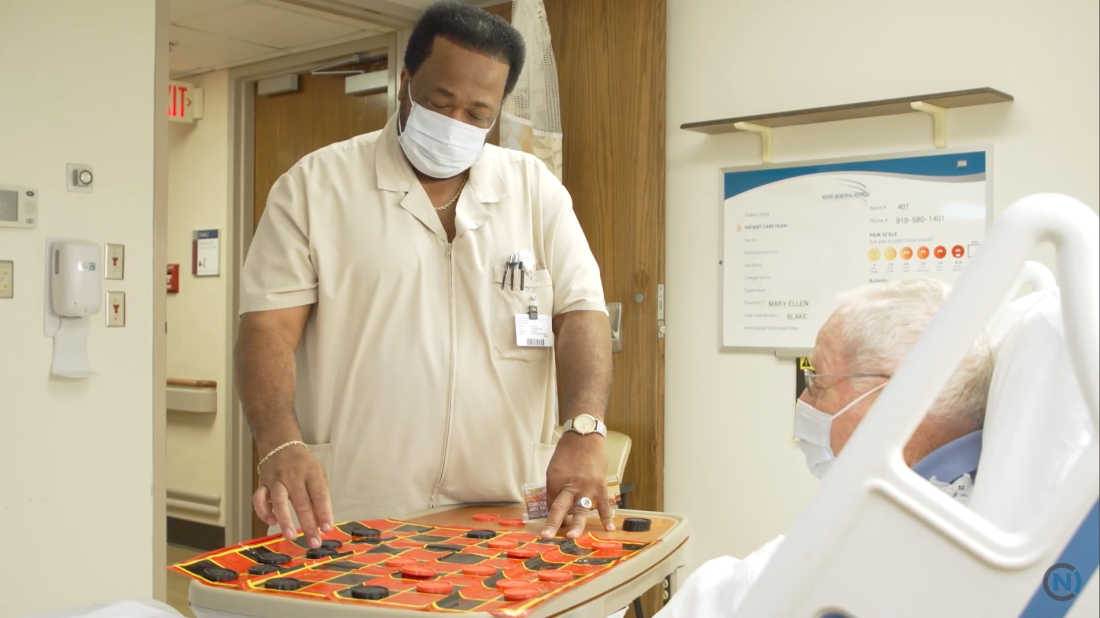Alzheimer’s and Dementia Care Blog
Alzheimer’s programs, or those more generally for dementia across the state, are not just involved with improving the quality-of-care patients receive in the hospital. They also want to ensure a high quality of life for adults outside of healthcare situations as they go about their daily lives.

The Problem
Dementia is a general term for the severe decline in mental abilities due to the brain’s physical deterioration. Affecting millions of Americans, Alzheimer’s disease, one form of dementia, is an affliction that impairs memory and cognitive abilities by attacking the brain and its neurons. While the impairments begin with occasional memory loss, the disease eventually progresses to making simple tasks, such as preparing meals or getting dressed, difficult to impossible to complete. In North Carolina, the disease currently affects 180,000 residents aged 65 and older, a number which is expected to increase to over 210,000 by 2025. While the thought of receiving an Alzheimer’s diagnosis is frightening to many, there are a growing number of programs and organizations that help those affected by the disease continue to live their lives normally and make the most of the time they have left.
The disease impacts the immediate family members of the diagnosed as well. As their loved ones require additional support in their everyday lives, family members take on additional caregiving responsibilities both to ensure they receive the care they need and to cherish the time they have left.
The Solution
Adults living with dementia tend to be admitted to the hospital more frequently and for longer periods of time compared to adults without dementia. One out of every four hospital beds is occupied by a patient suffering from Alzheimer’s or dementia. In North Carolina, there are 1600 emergency room visits annually per 1000 dementia patients. Thus, it is crucial for healthcare workers in hospitals to understand how to best care for these patients. At UNC Wayne Health Care in Goldsboro, staff are piloting a program, the Dementia Friendly Hospital Initiative, that trains employees on best practices for working with and caring for these patients. The training’s biggest goal – meeting patients where they are, through roleplaying activities, to ensure their comfort and safety. Rather than challenging a patient’s notion of where they are through correction, for example, nurses focus more on engaging patients through play to get them the treatment they need. Other strategies include creating “busy boxes” with items such as puzzles, word searches, and sensory toys to distract patients while they receive care. Physically, the hospital has installed lights that turn purple to indicate a hospital bed occupied by a patient with dementia.
The training is not just provided to nurses and other healthcare workers. Anyone who might encounter a dementia patient, including hospital housekeeping or security staff, is trained to ensure patients are comfortable throughout their entire hospital stay.
The Players
While still in its infancy, workers in Goldsboro say that the training has already helped to improve the ways in which they interact with dementia patients. The program has also been implemented at four other UNC Hospitals across the state (Hillsborough, Chapel Hill, Hendersonville, and Siler City) and has been funded for three years through a Duke Endowment grant. By the end of the three years, the program hopes to have trained 4000 employees, spanning multiple disciplines, across the five facilities. The program is aligned with guidance from the National Committee for Quality Assurance, a non-profit working to improve the quality of healthcare, and looks to connect discharged patients with resources from their local Area Agency on Aging.
The Promise
Alzheimer’s programs, or those more generally for dementia across the state, are not just involved with improving the quality-of-care patients receive in the hospital. They also want to ensure a high quality of life for adults outside of healthcare situations as they go about their daily lives. One such group, The Downsizers, helps older adults move out of larger homes into ones that are smaller and easier to manage. The company helps downsize the physical possessions of clients to reduce what they must remember, take care of, and stress about. For adults with Alzheimer’s, this service can be invaluable in lifting the burden of cleaning and maintenance in their homes and allowing them to make the most of the time they have left. Given the nature of their work, the Downsizers team developed protocols for working with and moving adults with dementia, something the Orange County Department on Aging could help provide through their Dementia-Friendly Business training. The training provides businesses with tools to better understand the needs of adults with dementia and how to best interact with them. Across Orange County, they have conducted trainings at over 100 local businesses and organizations. The training helps businesses interact with adults with dementia and recognize the early signs of Alzheimer’s disease. The latter is especially important for those businesses regularly interacting with customers, like the Orange County Meals on Wheels, which can then direct the customer to the resources they need to be supported. The overall goal of the program is to help businesses better interact with those suffering from dementia and other cognitive impairments and allow them to lead a more comfortable life in their home communities.



